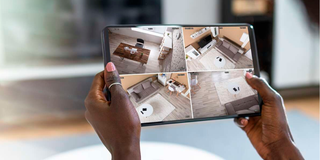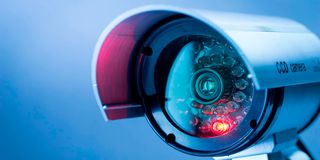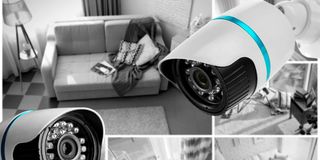
A nanny cam provides, to some degree, some peace of mind, or maybe assurance that even though you are separated by distance, the children are still within your reach.
For several reasons, a parent may decide to invest in a nanny cam. First, leaving your child with a stranger often causes anxiety. The ability to unspool your child’s day for yourself while you are away offers some degree of reprieve. Additionally, some children have unique needs, and a certain level of oversight is necessary. Although debate is still rife on whether it is the right thing to do, parents often install nanny cams as a cautionary measure.
Just before she gave birth, Eunice Keino, a nurse based in Eldoret, installed a nanny cam. “As a mother, it is instinctive to want to protect your child even when you are far away. A nanny cam provides, to some degree, some peace of mind, or maybe assurance that even though you are separated by distance, they (children) are still within your reach. Any accidents or incidents that may jeopardise their welfare can be prevented or the effects mitigated,” she starts.
Nothing prepared Eunice for what followed two months after her delivery. Like many new mothers, the first-time mum started the search for a nanny. Days later, a young woman arrived at her home, and after the normal onboarding process, the nanny settled in, giving Eunice the break she had so much wanted for two months. The following day, she went to run errands at a shopping centre near her house.
“I believe she tricked me. She requested me to buy her some medicine because she wasn’t feeling well. As a medic, I don't take any illness lightly, so I rushed to buy the medication. While at the shopping centre, I checked my phone and saw the nanny breastfeeding my child,” says the nurse attached to Moi Teaching and Referral Hospital.
She drove back to the house in a rush, filled with mixed emotions. She admits harbouring murderous thoughts for the few minutes she was on the road. “The security team at the gate knew immediately that something was wrong. I was hooting continuously, and this prompted them to follow me to the house. I went straight to the kitchen, and one of them followed me and averted what would have been a disastrous incident. My emotions almost got the best of me!”
As a standard protocol in her recruitment exercise, Eunice had intended to inquire about the incoming nanny’s HIV status. “I like to have these details to better know how the nanny fits into my household. So, before engaging a person, I let them know my requirements, and if they agree, we can proceed.” She had missed this stage of her nanny onboarding exercise and was sure she’d do it later.
This incident triggered her to demand that the nanny take a test. Eunice was too shaken to think straight. “Do I go to the hospital first or the police station? Who do I call?” A flood of emotions almost choked her. They would, moments later, head to the hospital where she works, to take another test. “I also took a test alongside the nanny and my child—just to be sure. My fears were confirmed. My child was put under post-exposure prophylaxis for 28 days. It was such an anxiety-filled wait that I wouldn’t wish to ever go through again.”
So affected was she by the events of that day that she didn’t seek legal redress. “In retrospect, I think I should have sought legal advice, not just for me but for other people out there who may fall victim to such.” She chose to let go and train her energies on raising her son. “I was just grateful that my child was okay,” she says. When asked why she knowingly wanted to infect Eunice’s child, the nanny said that the child had good looks. Later on, she would learn that when she was being recruited, the nanny had lied that her youngest child had been four. “She was still breastfeeding. Her youngest child was eight months old at the time,” Eunice says.
Her second hire was a scene straight from a Hollywood movie. “When she arrived, we went through the protocols I put in place. She was calm as a dove.” By this time, Eunice’s tentacles were always high to pick up any mischief in her house, so she kept looking at her phone. “I now know that I was acting out of a trauma, and I needed help.” The woman she had in her house may have been a drug peddler.
“She appeared inebriated for many hours of the day for the three days she lived in my house. I confronted her and discovered several sachets of white powder in her suitcase that I suspect was the cause of her inebriation. I was back to the drawing board once again. I wondered whether my child had been exposed to whatever drug she had in her suitcase. I reviewed the footage several times to no avail.”

With a camera, a parent can avert accidents or catch them in good time.
Eunice was not out of the woods yet. The next nanny she hired came from Uganda.
“One morning, while I was about to wake up, I checked my phone only to see her peeing in a jug and adding the contents of the jug to the brewing tea. She had only been in my house for 12 hours. God knows what lay ahead of me had I not watched the clip. One may think that I am obsessed. I am just a mother who has seen it all. There is an old Swahili saying that goes, tahadhari kabla ya hatari. I went to therapy later. I can’t say I am completely past the trauma. I still catch myself being overly cautious. Luckily, the current nanny has been good. She’s been with us for more than three years now.”
Eunice offers that installing a camera doesn’t always mean you don’t trust your nanny, as many would argue, it is just a tool to increase your vigilance. “Children depend on their caregivers entirely. Often, these caregivers may not attend to one’s child fully due to the other duties assigned to them. With a camera, a parent can avert accidents or catch them in good time.”
In 2019, Alice Gatungo came back home expecting to warmly hug her then seven-month-old baby. “At the end of the day, you just want to get back home and look in their eyes, hug them.” Alice did not find the baby or the nanny she had left her child with.
“At first I thought they had just stepped out and that they’d come back. Nothing alarming. An hour or so afterwards, I called my nanny only to be met with the automated “mteja” response. I couldn’t imagine that at only seven months, I was about to lose my daughter. My world was shaken.” Alice panicked and for a moment could not bring herself to call anyone. “The confusion was too much for me to think straight. As a mother, there is a false sense of assurance that you carry around. That your child can be so many things, but not lost. It is only when it happens to you or people you know that you grudgingly accept that it can happen to anyone.”
A few friends gathered at her home once she managed to make calls, and a poster was created hurriedly and circulated on various social media platforms. “It was a race against time for us. The nanny had roots in a neighbouring country, and all I kept thinking then was that she’d taken my child to her country. This would have complicated the issue even further. I reported the matter to the police even as we pushed the search efforts online. Hours later, my daughter was found in a thicket in Kitengela—we lived in Thika. This was my genesis with a nanny cam. I took leave from work to be with my daughter. A week later, I was required to report back, and this prompted me to hire a new nanny. This time, I employed extra caution by installing the camera.”
When she went back to work, Alice kept looking at her phone. She would dedicate time to monitor any movement made at home. “It is a tough balance to work in the healthcare sector and not dedicate all your focus on your work.”
Days later, she caught a misdemeanour. “One day, in my routine check-up during mealtime, the nanny picked a morsel of food that had dropped on the floor to feed my daughter. She didn’t know I was observing her as I had not told her I had a nanny cam in the house. She was so shocked when she heard my voice from the camera’s speaker.”
According to her, the decision not to tell her nanny that she had installed a camera was valid. “I thought it would be counterproductive to install it and then let them know since it was meant to catch any mischief.” With time, she noticed that she was developing a fixation with snooping and constant surveillance. “It caused me massive anxiety when I was unable to check the camera. The inability to remain in control was sickening. This is when I knew I was crossing certain lines I was not meant to. I went home one day, and I uninstalled it.” Five years later, Alice has slowly regained her peace and learned to trust those she hires to look after her daughter.
According to psychologist Winfrey Achieng’ from Chiromo Hospital Group, the motivation behind installing these cameras might come from different sources. “One key pusher is social media, where parents pick up a trend and implement it in their houses. This is easy to discard as the household may outgrow the trend. The other motivator is past experiences. Maybe, while growing up, a parent had bad experiences with caregivers who were not their parents. You find parents with traumatic pasts trying to avoid a repeat of the same to their children.” This, she says, could be a deep-rooted problem that may even affect the way they handle their children.
How does this affect parents?
Winfrey says that nanny cameras are good as long as they are used within certain limits. “Moderation, as is with many other things in life, is key. You don’t want to be compulsively obsessed with looking at your phone while going about other life activities.
The push to constantly keep tabs on your child may come from a good place, but may aggravate an already dire situation.

Secret spying creates suspicion. Once the nanny learns that you are spying on them, they will become performative.
“Some parents develop deep anxiety when not in a position to monitor their children’s activities while under the care of someone else. This may impede their productivity at work and social interaction outside work. They remain unsettled until they can access their phones. For such people, nothing is as important as remaining connected, notwithstanding technological and power failures that may interfere with this.”
On the effects this has on children, Winfrey says, “Parents should watch out not to translate their vigilance to helicopter parenting. Helicopter parenting is a style of parenting where parents excessively involve themselves in their children’s lives to the extent of controlling them through constantly hovering to prevent perceived harm or failure, potentially hindering their children’s development of independence and resilience. This may also result in co-dependency.” Winfrey shares. “When a child is denied the opportunity to exist autonomously, they might develop a co-dependent personality where they excessively rely on their relationships emotionally and psychologically to avoid the feeling of abandonment. It may also manifest as an extreme need for approval and recognition and a sense of guilt when asserting themselves.”
What about the nannies whose job description inspires the name of the very cameras installed to monitor them? “It is important for employers to make it clear to new nannies (or in the case of installation while they have already been hired), that there are cameras in the home.
Secret spying creates suspicion. Once the nanny learns that you are spying on them, they will become performative—only adhering to set norms while in the scope of the camera. It is good to install these cameras as an additional security feature and be open about them, and not use them as spying tools. Nanny cams alone cannot be used as the yardstick of compliance.
Besides, you must never create fear in your employees for them to work for you—which is what secret cameras do. Additionally, don’t just point out the bad things that are observed through your camera and forget to pass compliments when they do well in handling the tasks assigned to them. This creates a good balance and sense of responsibility.’’







